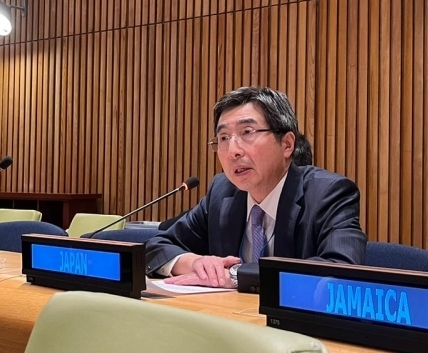Statement by H.E. Ambassador ISHIKANE Kimihiro, Permanent Representative of Japan to the United Nations, at the Informal Meeting of the General Assembly on the Intergovernmental Negotiations on Security Council Reform
2023/1/26

(Check against delivery)
Thank you for convening this meeting. Japan aligns itself with the statement delivered by Ambassador Antje Leendertse of Germany on behalf of the G4. Please allow me to make additional remarks in my national capacity.
Mr. Co-Chairs,
We are fully aware that you asked us, in your letter dated 5 December last year, as your predecessors did, to seek greater commonalities before this first meeting. We wished to do that, but could not, due to the lack of a negotiating text. We can narrow our differences only through real give-and-take negotiations based on a text, not by repeated exchanges of statements.
Some Member States claim that without reaching a consensus first, negotiations will reach a stalemate and break the IGN process itself. However, ladies and gentlemen, if we reach a consensus before negotiation, we do not need further negotiation. In the real world of diplomacy, no consensus can be achieved without negotiations. We all know that. We cannot tolerate the blockage of discussion due to the exercise of de facto veto power under the mask of the pleasant-sounding word “consensus.”
Of course, a text is not a silver bullet or a magic wand that can automatically solve the problem, nor does it guarantee an outcome that everybody is satisfied with. Nonetheless, the truth is that text-based negotiations are the only practical way to finally ensure meaningful progress, and without a text, nothing can be negotiated, thus nothing can be achieved at all. The past 30 years have proven this undeniable fact, and we must get out of this abysmal trap now. As the President of the General Assembly rightly stated the other day, let us move from a position of “no” or “later” to a position of “yes” and “now.”
In this context, let us remind ourselves that as many as 164 Member States have called for a text to serve as the basis for negotiations according to document A/72/510/Rev.1, the letter from the Permanent Representative of Saint Vincent and the Grenadines addressed to the Secretary-General dated 2 October 2017. A silent majority clearly supports text-based negotiations.
Mr. Co-Chairs, distinguished Member States,
We are frustrated that some Member States intentionally describe Security Council reform as an issue of the G4’s ambition. It is an urgent matter for all the Member States to correct an outdated structure totally unacceptable for the current era. This sense of urgency was articulated by more than 70 Heads of State and Government during the high-level week last September. We have already identified enough convergences in the “Revised Co-Chairs’ Elements Paper,” so why not move on to the next step? We can move the convergences to another new paper, and insert the divergences in the form of brackets. Japan calls upon all of us to start text-based negotiations as soon as possible, by the end of this year’s IGN, looking ahead at drafting, negotiating, and voting on a resolution, taking into consideration that 2023 marks the 60th anniversary of the previous reform, that the Summit of the Future is going to be held in 2024, and that 2025 will be the 80th anniversary of the founding of the UN. Based on the “Revised Co-Chairs’ Elements Paper” of May 2022, we can start negotiations without delay.
At the same time, to increase the transparency and inclusiveness of the negotiations, we should start keeping records of the discussions and introducing webcast when applicable. We ask for the Co-Chairs’ help on that front. Consultations in a closed format will also be utilized, as necessary.
With regard to the substance of regional representation, we cannot separate the topic from the issue of enlarged categories of membership. In the “Elements Paper,” the positions of certain groups are explicitly written down. Some Member States, including the UfC group of 12 countries, propose:
- Permanent seat: 0
- Non-permanent seats:
- Africa – 3 longer-term seats
- Asia-Pacific – 3 longer-term seats
- Latin American and the Caribbean – 2 longer-term seats
- Western European and Others: 1 longer-term seat
- Small States including Small Island Developing States [SIDS] – 1 two-year rotating seat across all regions.
On the other hand, a significant number of Member States including the African Group, the Arab Group, CARICOM, L69, and the G4 propose:
- Permanent seats:
- Africa – no less than 2, or 2
- Asia-Pacific – 2
- Latin American and the Caribbean – 1
- Western Europe and Others – 1
- Arab States – 1
- Non-permanent two-year seats:
- Africa – no less than 2, 1, 1-2, or 2
- Asia-Pacific – 1
- Latin American and the Caribbean – 1
- Western European and Others – 1
- Small States including Small Island Developing States [SIDS] – 1
- Arab States across regions – proportional representation
Issues raised by the Co-Chairs, including cross-regional representation, African representation, and a definition of the concepts of “equitable geographical distribution” and “regional representation”, will be deliberated in a concrete manner in the negotiations. Numbers and language can be further negotiated in the text as well. As such, we should advance text-based negotiations step by step, sentence by sentence, so that we can reach a real consensus, which requires everyone to make compromises for the greater good.
Let us begin.
I thank you.
